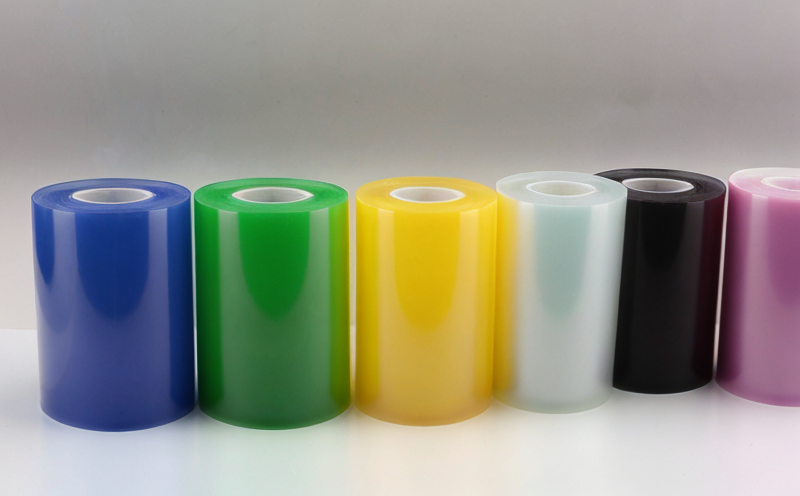ASTM E831 Thermal Expansion Testing of Plastic Sheets
The ASTM E831 standard provides a standardized method to determine the linear thermal expansion coefficients (CTE) of plastic sheets, films, and other similar materials. This is crucial for quality managers, compliance officers, R&D engineers, and procurement teams who need accurate data on how these materials behave under varying temperatures.
Thermal expansion testing is particularly important in sectors such as automotive manufacturing, where the performance of plastics can directly impact vehicle safety and efficiency; construction, where durability and stability are paramount for exterior finishes and building components; and electronics production, where reliability at various temperature extremes is critical. The results from ASTM E831 help ensure that plastic sheets meet the necessary specifications for these applications.
The testing process involves subjecting a specimen to controlled temperature changes while measuring its linear dimensions with high precision. This allows engineers to predict how the material will perform in real-world conditions, ensuring product reliability and safety. By understanding the thermal expansion characteristics of plastics, manufacturers can optimize their design processes and improve overall performance.
The ASTM E831 procedure typically consists of several steps: preparing the specimen according to specified dimensions and tolerances; mounting it onto a suitable holder within the testing apparatus; applying controlled heating or cooling rates while monitoring dimensional changes; and analyzing the data to calculate thermal expansion coefficients. The equipment used for this test includes differential thermal analyzers (DTAs), dilatometers, or laser interferometers depending on the required precision level.
Understanding these parameters is essential for anyone involved in material selection for new product development or existing quality assurance programs. For instance, automotive manufacturers might use ASTM E831 results to ensure that their interior trim components won't warp over time due to temperature fluctuations inside vehicles; construction firms could rely on this information when specifying exterior cladding materials susceptible to environmental exposure.
Accuracy in thermal expansion testing is vital because even small deviations from expected values can lead to significant issues down the line. Misalignment during manufacturing processes, reduced product lifecycles, or increased maintenance costs are just some of the potential problems that arise if accurate data isn't available early enough in the design cycle.
To summarize, ASTM E831 offers a reliable framework for assessing thermal expansion properties which is essential for ensuring consistent quality across various industries. Its role cannot be overstated given its impact on material performance under different temperatures.
- Ensures consistency and reliability of plastic sheet materials
- Promotes better understanding of how plastics behave at varying temperatures
- Supports safer and more efficient product designs in critical sectors like automotive, construction, and electronics
- Aids in optimizing manufacturing processes through precise material selection
Why It Matters
The importance of ASTM E831 cannot be overstated as it plays a pivotal role in guaranteeing the quality and performance of plastic sheets across numerous industries. In sectors like automotive, construction, and electronics, where precision is key to product success, accurate thermal expansion data is indispensable.
For automotive manufacturers, understanding how plastics expand or contract with temperature changes helps them design interiors that maintain their shape throughout diverse environmental conditions without compromising safety standards. Similarly, in the construction industry, knowing a material's thermal behavior ensures that exterior cladding remains stable against weathering and structural integrity issues over extended periods.
In electronics manufacturing, precise control over component materials' expansion rates is crucial for preventing short circuits or mechanical failures caused by misalignment due to temperature variations during operation. By leveraging ASTM E831 results early in the design phase, companies can avoid costly rework later on and enhance overall product performance.
Moreover, compliance with this standard ensures that products meet regulatory requirements set forth by relevant authorities worldwide. This not only protects consumers but also fosters trust among stakeholders within each respective sector.
In essence, ASTM E831 serves as a cornerstone for ensuring reliable performance of plastic sheets across various applications. Its significance lies in its ability to provide clear and consistent data that supports informed decision-making processes throughout the entire lifecycle of products involving these materials.
Environmental and Sustainability Contributions
The implementation of ASTM E831 thermal expansion testing contributes positively to environmental sustainability efforts by promoting the use of materials that perform consistently across different temperatures. This consistency ensures longer product lifecycles, reducing waste generation associated with premature failures due to temperature-related issues.
Additionally, understanding how plastics behave thermally allows manufacturers to select more sustainable alternatives when possible without sacrificing performance. For example, using recycled content in plastic sheets can be optimized if the thermal expansion properties are well understood from the outset. This approach supports broader initiatives aimed at reducing carbon footprints and promoting circular economy practices.
Moreover, by ensuring that plastic products meet stringent quality standards through ASTM E831 testing, companies contribute to safer disposal processes later on. Properly designed plastics are less likely to break down into microplastics or other harmful pollutants during recycling or incineration.
In conclusion, the application of ASTM E831 thermal expansion testing aligns with broader goals related to environmental stewardship and sustainable development. It enables industries relying heavily on plastic materials to make informed choices that balance economic viability with ecological responsibility.





